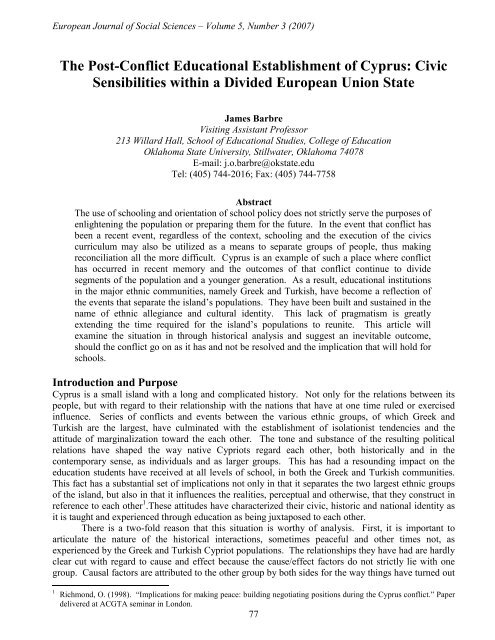european journal of social sciences issn: 1450-2267 - EuroJournals
european journal of social sciences issn: 1450-2267 - EuroJournals
european journal of social sciences issn: 1450-2267 - EuroJournals
You also want an ePaper? Increase the reach of your titles
YUMPU automatically turns print PDFs into web optimized ePapers that Google loves.
European Journal <strong>of</strong> Social Sciences – Volume 5, Number 3 (2007)<br />
The Post-Conflict Educational Establishment <strong>of</strong> Cyprus: Civic<br />
Sensibilities within a Divided European Union State<br />
James Barbre<br />
Visiting Assistant Pr<strong>of</strong>essor<br />
213 Willard Hall, School <strong>of</strong> Educational Studies, College <strong>of</strong> Education<br />
Oklahoma State University, Stillwater, Oklahoma 74078<br />
E-mail: j.o.barbre@okstate.edu<br />
Tel: (405) 744-2016; Fax: (405) 744-7758<br />
Abstract<br />
The use <strong>of</strong> schooling and orientation <strong>of</strong> school policy does not strictly serve the purposes <strong>of</strong><br />
enlightening the population or preparing them for the future. In the event that conflict has<br />
been a recent event, regardless <strong>of</strong> the context, schooling and the execution <strong>of</strong> the civics<br />
curriculum may also be utilized as a means to separate groups <strong>of</strong> people, thus making<br />
reconciliation all the more difficult. Cyprus is an example <strong>of</strong> such a place where conflict<br />
has occurred in recent memory and the outcomes <strong>of</strong> that conflict continue to divide<br />
segments <strong>of</strong> the population and a younger generation. As a result, educational institutions<br />
in the major ethnic communities, namely Greek and Turkish, have become a reflection <strong>of</strong><br />
the events that separate the island’s populations. They have been built and sustained in the<br />
name <strong>of</strong> ethnic allegiance and cultural identity. This lack <strong>of</strong> pragmatism is greatly<br />
extending the time required for the island’s populations to reunite. This article will<br />
examine the situation in through historical analysis and suggest an inevitable outcome,<br />
should the conflict go on as it has and not be resolved and the implication that will hold for<br />
schools.<br />
Introduction and Purpose<br />
Cyprus is a small island with a long and complicated history. Not only for the relations between its<br />
people, but with regard to their relationship with the nations that have at one time ruled or exercised<br />
influence. Series <strong>of</strong> conflicts and events between the various ethnic groups, <strong>of</strong> which Greek and<br />
Turkish are the largest, have culminated with the establishment <strong>of</strong> isolationist tendencies and the<br />
attitude <strong>of</strong> marginalization toward the each other. The tone and substance <strong>of</strong> the resulting political<br />
relations have shaped the way native Cypriots regard each other, both historically and in the<br />
contemporary sense, as individuals and as larger groups. This has had a resounding impact on the<br />
education students have received at all levels <strong>of</strong> school, in both the Greek and Turkish communities.<br />
This fact has a substantial set <strong>of</strong> implications not only in that it separates the two largest ethnic groups<br />
<strong>of</strong> the island, but also in that it influences the realities, perceptual and otherwise, that they construct in<br />
reference to each other 1 .These attitudes have characterized their civic, historic and national identity as<br />
it is taught and experienced through education as being juxtaposed to each other.<br />
There is a two-fold reason that this situation is worthy <strong>of</strong> analysis. First, it is important to<br />
articulate the nature <strong>of</strong> the historical interactions, sometimes peaceful and other times not, as<br />
experienced by the Greek and Turkish Cypriot populations. The relationships they have had are hardly<br />
clear cut with regard to cause and effect because the cause/effect factors do not strictly lie with one<br />
group. Causal factors are attributed to the other group by both sides for the way things have turned out<br />
1<br />
Richmond, O. (1998). “Implications for making peace: building negotiating positions during the Cyprus conflict.” Paper<br />
delivered at ACGTA seminar in London.<br />
77

















